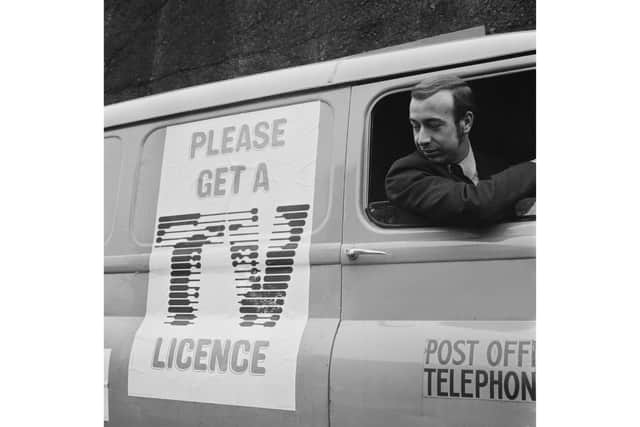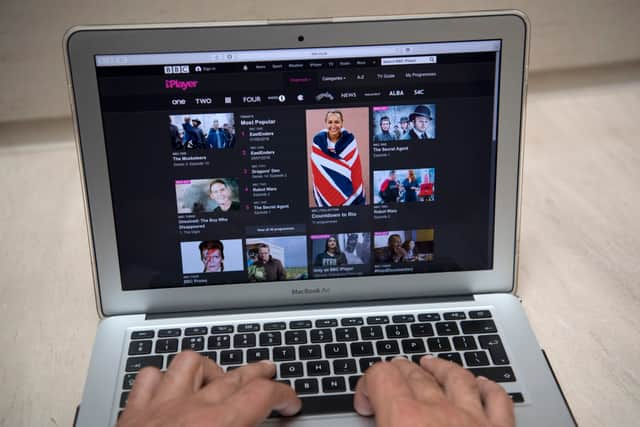BBC TV Licence: How has the price of watching television in the UK gone up over the years since its inception
and live on Freeview channel 276
TV licensing in the UK has formed the backbone of raising revenue for the BBC for nearly a century. Any household watching or recording TV at the same time it is being broadcast is required to hold a TV licence.
Originally a radio licence when it was launched in November 1923, it only cost 50p a year back then - but things have changed massively since.
Advertisement
Hide AdAdvertisement
Hide AdAfter the Second World War, the licence was expanded to include televisions in 1946 at an additional cost of £2 - a big difference to the cost viewers face these days.
As prices have changed so have other changes with time such as incorporating BBC iPlayer into the fee and watching live TV over internet streaming.
Early days of the TV licence


NationalWorld takes a look back at how the cost of a TV licence has changed over the years - among other changes.
The first combined radio and TV licence was launched for £2 in June 1946 but it wasn't until January 1968 - following the invention of coloured TV - that a supplementary licence fee for colour TV was introduced. To this day, TV licences for colour and black and white TV can be purchased separately.
Advertisement
Hide AdAdvertisement
Hide AdRadio-only licences were subsequently scrapped in 1971.
1970s and 1980s
By the end of the 1970s, prices for a TV licence had risen to £12 for black and white and £34 for colour.
Prices would then begin to rise sharply and by the end of the 1980s, they had nearly doubled. In 1989, a black and white licence cost £22 while colour TV would now set you back £66.
For a time within living memory for many people, a colour TV licence costs nearly three times today the price it did only 34 years ago.
Advertisement
Hide AdAdvertisement
Hide AdThe 1990s and the turn of the century
Fast forward to 1995 and the cost of a TV licence here was now £86.50 for colour and £28.50 for black and white.
Within only four years in 1999, viewers would have to pay over £100 for a colour TV licence for the first time.
A decade later shows how the rate of price increases here slowed down drastically. In 2009, a coloured TV licence cost £142.50 for colour and £48 for black and white.


The future - what happens to the licence fee?
The most recent price changes to TV licensing are as follows:
Advertisement
Hide AdAdvertisement
Hide Ad- April 2017: £147
- April 2018: £150.50
- April 2019: £154.50
- April 2020: £157.50
- April 2021: £159
Of concern to the BBC is how the number of people being issued with TV licences has experienced significant drops in in recent years.
In 2018, 26,183,000 TV licences were issued but only 24,372,000 were issued in 2023.
Similarly, the estimated TV licence evasion rate rose from 5.2% in 2011/12 to 8.9% in 2021/22 - according to statistics on the UK parliament website.
In more recent years, the fee has become a source of much debate. There are growing calls for the licence fee to be scrapped - including the 'Axe the Tax' campaign supported by the TaxPayers' Alliance.
Advertisement
Hide AdAdvertisement
Hide AdSome MPs have also recently called for the fee to be scrapped - calls that may lead to decisive action being taken in the near future. A Guardian article says the fee could be abolished by 2027.
According to the Daily Mail in August 2023, a BBC spokesperson spoke about a lower number of fees being paid for and about the fee needing to evolve.
A BBC spokesperson said: "The overwhelming majority of households – approximately 9 out of 10 – are licensed and receive brilliant BBC programming and services across TV, radio and online for 44p a day. Licence fee revenue is holding up well and has fallen by just 1.6% in the last year despite the pressures of increased choice in the market and the rising cost of living faced by all media organisations. Our focus is ensuring we continue to find new ways to serve all audiences.
"The licence fee is the agreed method of funding until at least 2027 and ensures the BBC is an independent, universal broadcaster, which invests in UK creativity and talent. We welcome a debate on whether the licence fee needs to evolve for the future."
Comment Guidelines
National World encourages reader discussion on our stories. User feedback, insights and back-and-forth exchanges add a rich layer of context to reporting. Please review our Community Guidelines before commenting.
